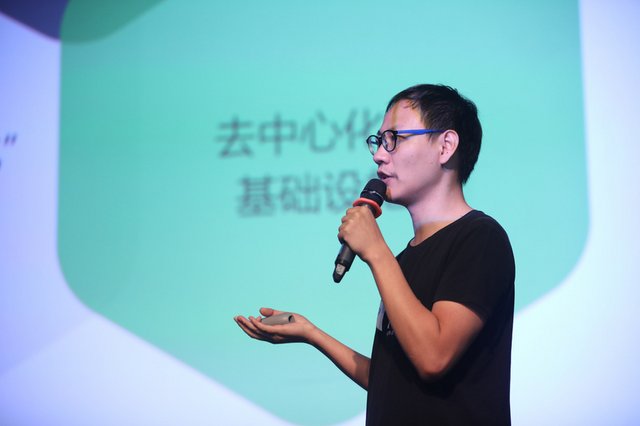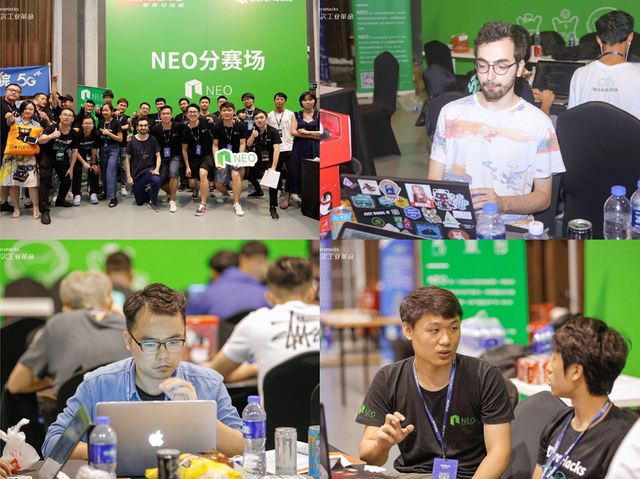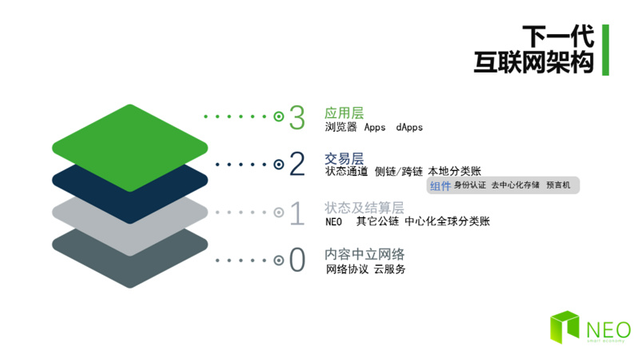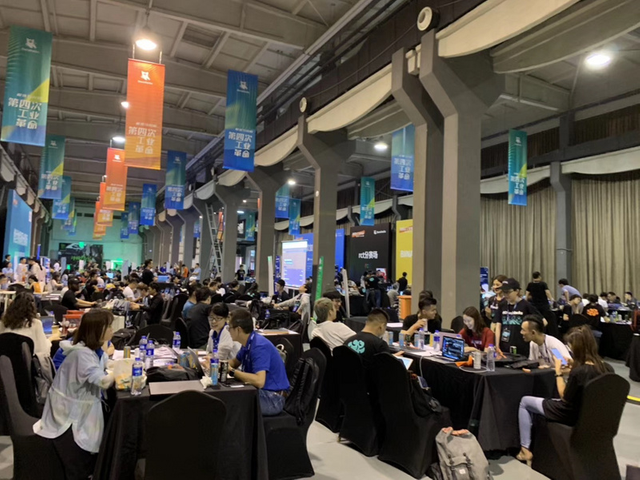Interview with NEO founder Zhang Yuwen: Using the blockchain to shake the future of the Internet.
NEO is a community-based blockchain project that was officially established in 2014 and was open sourced in Github in June 2015.
On July 19th, the geek marathon sponsored by DoraHacks - "The Fourth Industrial Revolution" was held as scheduled at the Chaoyang Planning Art Museum in Beijing. NEO founder and core developer Zhang Yuwen accepted our exclusive interview. Regarding the current status of Internet development, blockchain technology innovation and the next generation Internet architecture, Zhang Yiwen has answered them one by one.
Zhang Yuwen, founder and core developer of NEO, founder of dBFT consensus mechanism, blockchain technology and computer security expert, CISA information system auditor, worked in Shanda and Firecoin, engaged in information security and digital currency research and development.
DoraHacks: Internet technology has brought about disruptive changes in this era. In comparison, what do you think the blockchain will bring us? What is the relationship between the two?
Zhang Yuwen: The Internet's network architecture is relatively simple. The data operation principle is to use a special computer language protocol (TCP/IP, http, https, etc.) to ensure data arrives safely and reliably at a specified destination. The application we use is built on top of these protocols. The user accesses the data through the browser and then provides the data to the application. The website application is equivalent to performing the process of data acquisition, storage processing and calculation, and then the result of the calculation. Returned and presented to the user via the browser.
It seems that the Internet is now very central, and users fully trust the services they use and provide them with personal data.
For example: When we use a search engine, the search engine will process it in the background according to the keywords we provide, and then push the search results to us. We don't know how to get this result, the background is treated like a black box. Our needs, and the results we get, we can't verify, is it possible to push us what it wants us to see, not what we really need?
Another example is that we buy things on the shopping site. The website records the user's browsing and purchase records. If we switch to another shopping site, the search results may be related to the previous ones.
This is a deficiency of the Internet architecture. Users submit data to the application, but they do not fully control their own data. On the one hand, it will lead to privacy leakage, and on the other hand, data sharing between applications will not be shared.
What is a blockchain? Blockchain is a decentralized distributed ledger database, and the emergence of blockchain technology can make up for the lack of Internet development.
DoraHacks: Can the blockchain solve the current problem of Internet centralization? For example, the privacy leak you mentioned?
Zhang Yuwen: When it comes to the next generation of the Internet, the architecture will change dramatically. First, the user has ownership of his or her own data. The application only has the right to use and only has access to the data it needs.
For example, as an online game operator, the core business is to operate games to bring a good user experience. One has to mention an anti-addiction problem that limits the length of time for minors in online games. The existing method is to perform real-name verification by uploading an ID card by a user. In the process, the website acquires redundant data, and the importance of the data is self-evident.
DoraHacks: So, can we trust a third party completely?
Zhang Yuwen: We should not believe in a credible third party, but should believe in a verifiable calculation.
The user is using Alipay to transfer money, and the purpose is to implement accounting through the network. So is there a possibility for third-party accounting agencies to do evil? In recent years, Internet companies are doing anti-corruption, and the case of the risk control department helping illegal websites access third-party payment channels has been repeatedly exposed. Even without a motive, these institutions cannot restrain employees from doing evil. Thus, trusting a third party is not an ideal solution.
The next generation of the Internet will solve this problem. From the change of the application side, no longer the data collection, the application will be browserized, like the view, only use the data it needs and show a part. The infrastructure needed for the next generation of the Internet will also be decentralized.
DoraHacks: What are NEO's ideas about the structure of the next generation Internet?
Zhang Yuwen: We think the next generation Internet will be divided into 4 layers. Layer 0 can be called a content-neutral network, and it will be basically similar to the one we are using now. There is also a cloud service, and the next-generation Internet infrastructure will be built on cloud services. The first level is the status and settlement layer, which consists of the public chain and the centralized global ledger. The future centralized central ledger will remain. A lot of content on the Internet is suitable for providing services in a centralized way. Decentralization is only a means, not an end. This layer can be imagined as one or more large databases that store a large amount of data.
The characteristics of the blockchain are that the verification process is open and transparent, and everyone can verify it. This will directly lead to the problem that the first layer is inefficient and cannot meet the needs of large-scale commercial use of the Internet. Most transactions and services will occur in the future. On the 2nd floor. This layer of transactions and business does not need to be verified by everyone, the parties can verify it.
Finally, the application layer will be built on top of these architectures.
In addition, some components may span multiple levels. For example, identity authentication, decentralized storage, and predictive machines.
DoraHacks: What role will NEO play in the next generation of the Internet? Or what is NEO's vision and mission?
Zhang Yuwen: NEO's positioning in the next generation Internet will focus on the status and settlement and transaction layers.
The limitations of the current industry are mainly focused on addressing the needs of these three aspects: reliability, high throughput and big data. Reliability mainly refers to the security and stability of operations, and the irreversibility of transactions. Commercial applications running on the Internet require high throughput as a basis. In addition, the cost of expensive blockchain data preservation is also an important reason hindering the development of the industry. The blockchain is a highly redundant structure. Everyone can verify all the data. To carry large-scale commercial applications, it is necessary to store massive amounts of business data. These conditions have not yet reached the current blockchain technology.
NEO is currently developing NEO3, which is to solve the three major problems of reliability, high throughput and big data storage. In terms of stability, we adopted the dBFT2.0 consensus mechanism, which provides single-block finalism, which means that the NEO blockchain cannot be forked and transactions are irreversible. Regarding the TPS issue, we have adjusted the entire architecture. First, we have enhanced the TPS of the layer network and will support the interconnection of the Layer 2 network. In terms of data storage, we have a distributed storage network, NeoFS, which is similar to IPFS, but it is built into our NEO nodes and can be accessed directly by smart contracts.
In addition, NEO supports multiple development languages, multiple development platforms, and supports parallel execution of smart contracts to meet diverse development needs. NEO3 also includes lightweight, cross-platform virtual machine NeoVM, decentralized identity authentication to form NeoID and built-in predictor Oracle.
NEO's mission is to provide the best infrastructure for large-scale commercial applications.
DoraHacks: What is NEO's current concern?
Zhang Yuwen: Our main work at this stage is the development of NEO3 infrastructure. In addition, we launched the Neo EcoBoost program to work hard to develop the ecology. We will provide $100 million in project incubation funding with the goal of providing funding, community, marketing collaboration and support for the early development of seed projects. In addition, we also provide relevant education and training, and complete development tools to help you better use NEO for development.
We encourage everyone to develop on NEO, because the experience brought by NEO is extremely friendly. Developers can use the Neo visual studio development kit and the Neo express node single-node private chain build program, which can be built and connected in one click. The components of the development tool.
Another natural advantage of NEO is that developers can quickly develop smart contracts based on the NEO blockchain without having to learn a new language. This is because NEO smart contracts support mainstream programming languages such as C#, Java, and Python. This is not the same as many other blockchains, such as Ethereum, which uses its own language. We also have an office in Seattle that will focus on developing very handy tools that allow developers to develop using traditional development tools without having to delve into the blockchain expertise.
If developers are going to spend time learning new development languages and tools, then the focus on the business may be reduced. If you can use their familiar development tools and languages, it is much easier for developers to master the blockchain development techniques. So what NEO is doing is to minimize the threshold for developers to enter the blockchain world.
DoraHacks: This time NEO joined the "fourth industrial revolution" geek marathon, what kind of consideration is NEO?
Zhang Yuwen: I am very happy to have the opportunity to participate. We hope to get close to the developer population and find more developers, and our competition is also biased towards the development of infrastructure.
Another important purpose is to convey to everyone the idea of the next generation Internet. Because our current Internet is not perfect, and the blockchain can make up for the many shortcomings of the existing Internet, I hope to help everyone imagine what the next generation Internet should look like.
DoraHacks: Will the arrival of the next generation Internet era have a certain impact on the existing technology landscape?
Zhang Yuwen: The popularity of everything is going to be phased. For example, to pay for this, many people used cash many years ago. Later, many people started to swipe their cards, and now they are paying for their mobile phones and even paying for their faces. The goal of convenient payment is being realized more and more quickly.
In fact, it is more convenient to pay for this, mainly based on the continuous improvement of infrastructure. If we want to make the blockchain reach the level of popularity, we need to constantly improve the infrastructure, lower the threshold for use, and increase the usage scenarios.
I firmly believe that the future of companies that rely on data development (such as today's Google, Facebook, domestic BAT giants) will gradually transform into a distributed, decentralized application such as dApps as the mainstream structure. There is no doubt that this will ignite a wave of new wave of technology entrepreneurship.
However, the current global technology giants are very dependent on centralization, they need to collect a large amount of user data, and then establish a monopoly of a single trust organization. If these companies do blockchain and make a decentralized system their trust system, then these tech giants may lose their foothold. So in my understanding, they should not try to completely decentralize the blockchain. It is more likely that they will do some alliance chains with certain entry barriers to further consolidate their monopoly position.




Congratulations @pengseung! You have completed the following achievement on the Steem blockchain and have been rewarded with new badge(s) :
You can view your badges on your Steem Board and compare to others on the Steem Ranking
If you no longer want to receive notifications, reply to this comment with the word
STOPTo support your work, I also upvoted your post!
Vote for @Steemitboard as a witness to get one more award and increased upvotes!